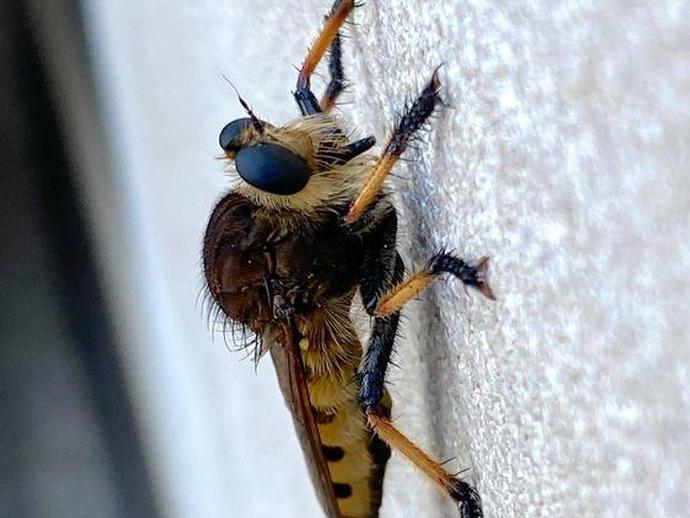September 13, 2021
Ben here with today's edition of #BenInNature presented by our friends at Carter Bank & Trust!
I spotted this red-footed cannibalfly (Promachus rufipes) hanging out at the museum last week, most likely waiting for something tasty to arrive in our butterfly garden. These guys belong to the family Asilidae, also known as the robber flies or assassin flies, and when it comes to apex predators of the insect world, they're right up there with dragonflies!
Robber flies are ambush predators and will snatch other insects right out of the air! They have powerful spiny legs that help them ensnare prey and a short, strong proboscis they use to stab their prey and inject it with enzymes that paralyze the insect and digest its innards (delicious!). You might also notice that the robber fly appears to have a bristly mustache; this is known as a "mystax," which is derived from the Greek word for "mustache" or "upper lip." It's believed that the robber fly's mustache helps protect its face when it's grappling with a struggling prey item. These guys will take on stinging wasps and hornets, dragonflies, and even other robber flies, so they need all the protection they can get!
While robber flies can deliver a painful bite, they don't have any interest in biting humans and will only do so if handled roughly.
ABOUT #BenInNature
Social distancing can be difficult, but it presents a great opportunity to become reacquainted with nature. In this series of posts, Administrator of Science Ben Williams ventures outdoors to record a snapshot of the unique sights that can be found in the natural world. New updates are posted Monday - Friday, with previous posts highlighted on the weekends. This series of posts is made possible thanks to the support of VMNH Corporate Partner Carter Bank & Trust (www.cbtcares.com).
NATURE PHOTO IDENTIFICATIONS
If you discover something in nature that you would like help identifying, be sure to message us right here on Facebook with a picture (please include location and date of picture) and we'll have our experts help you identify it!

 Hours & Admissions
Hours & Admissions Directions
Directions

